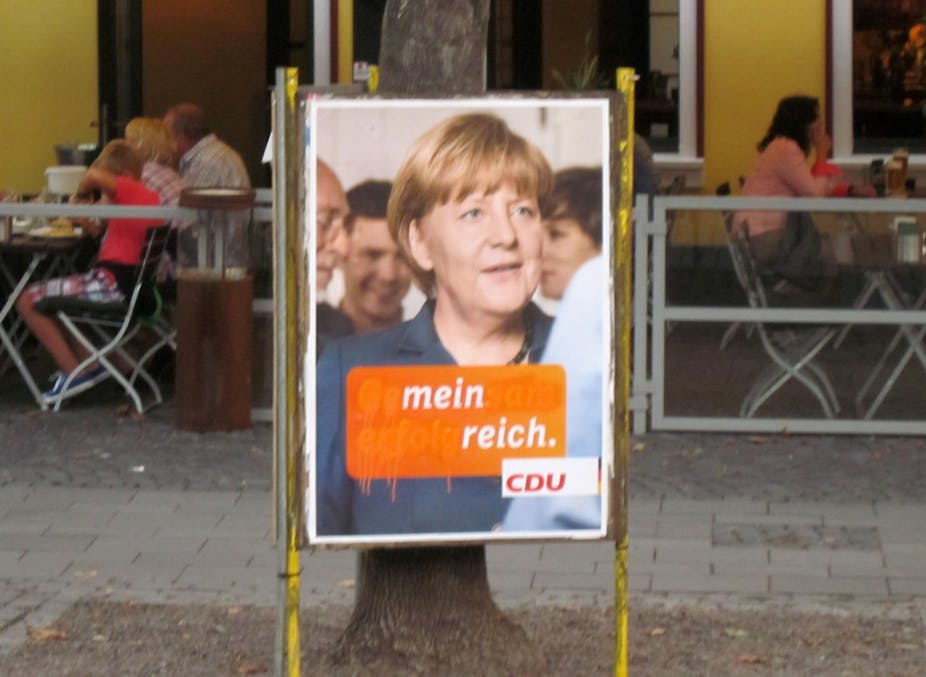Germans go to the polls this weekend to elect a new four-year parliament – the Bundestag. Barring something extraordinary a coalition headed by Angela Merkel will be returned.
But, despite what some commentators like to say, the campaign has been far from dull. We’ve had saucy adverts featuring a 90-second graphic sex scene from The Party (Die Partei), which wants to build a wall around Germany and put Merkel on trial in a cage.
We’ve had red faces from the centre-right FPD when it was discovered they were using the same campaign ads as the far-right NPD. We’ve had the Christian Democrats handing out toothbrushes with the slogan: “CDU on everybody’s lips”.
The Social Democrats (SPD) and Greens lost 100,000 posters which were so eco-friendly that the recycled paper they were printed on turned to pulp at the first drops of rain. And who can forget the dullest flash mob ever when 13 members of the youth wing of Merkel’s CDU got together in a diamond formation with their hands in Merkel’s iconic diamond hand gesture? Well, everyone, as it happens - in fact, no one noticed at the time as the video below shows.
But don’t expect the nail-biting tension of the UK election of 2010 which saw the formation of the first coalition government in Britain since the 1970s. Germany’s system of proportional representation pretty much guarantees a coalition government, so the question is not: “Oh dear, will there be a coalition government?” but “Which kind of coalition will we get?”
Merkel and whose army?
Recent polling has pointed to Merkel’s centre-right Christian Democrats winning the largest share of the votes, an estimated 39%. For the past four years, Merkel has governed with, as her junior partner, the liberal Free Democrats (FDP), but the latest polls show that, for the first time in the history of the Federal Republic, the FDP might not get enough votes to pass the 5% threshold needed to enter the Bundestag.
Even if they manage to scrape in, it would be very narrowly and Merkel would not have a comfortable enough majority to govern in partnership with them. In that case Merkel will have to look for another suitable coalition partner. The most natural choice – although this will sound astonishing for British readers used to Westminster-style oppositional politics – are the SPD, the main party of the centre-left, which is expected to get around 26% of the votes.
The CDU/CSU and the SPD have formed a “grand coalition” before, and their most recent experience of governing together was between 2005 and 2009. During that period, Merkel seemed to get on well with her colleagues from the SPD and the partnership achieved some small, but important reforms. Key achievements were the extension of parental leave, increased state funding for nurseries, some long overdue constitutional reform, and the greening of the economy.
But despite this track record of success, grand coalitions do not have the best reputation in Germany - many commentators argue that having the two biggest parties in a coalition leaves the opposition in a weak position. It is also often said that Grand Coalitions blur the distinction between left and right and that the policy outcome has nobody’s stamp on it.
These are valid arguments - but the current election campaign is proof that the differences between Germany’s two big parties are small anyway. Both are committed to keeping the Euro and supporting indebted member states of the Eurozone. Only the newly founded party Alternative for Germany dared to challenge this consensus and called for Germany to leave the Euro. But whether they will have enough support to enter the Bundestag remains still unclear. The most recent polls had the AfD at 4%
Both the CDU and the SPD remain committed to the welfare state and high levels of spending. Both parties call for more investment into childcare, although there exist different views when it comes to the best solution for families. An important issue during the election campaign has been the NSA affair, but both parties offer similar views on the future of data protection.
Personality politics
Since the parties do not differ significantly in their positions, the campaigns focused on personalities rather than policies. Steinbrück, for example, this week appeared on the youth-oriented comedy show: Circus Halligalli (the presenters of which asked him: “Why are you doing this to yourself?”)
The SPD and Greens sought to hang the NSA issue like a millstone around Merkel’s neck. Steinbrück accused Merkel of having broken her oath of office to protect the German people from harm, arguing that Germans’ constitutional rights have been massively infringed.
But concentrating on personalities gives “Mutti” Merkel a clear advantage. She continues to be one of the most popular, if not the most popular, of the leaders on the German political scene.
Will the Social Democrats be able to form a government without her? Their natural coalition partners are the centre-left Greens, who however are expected to win only 11 per cent of the votes, which, added to the SPD’s 26 per cent, does not add up to a majority of seats in the Bundestag.
If Steinbruck wants to become chancellor, he would probably need to try to form a three-party coalition with the Greens and the Left Party (Die Linke) which is expected to win about 8%. Leading Social Democrats however refuse to consider a coalition with the Left Party due to the latter’s Communist roots. Many Left Party members used to be members of the SPD, but were disgruntled with the party’s shift to the right under Gerhard Schroeder between 1998 and 2005.
Thus it is very likely that Angela Merkel will stay as Germany’s Chancellor for another four years, which would see her eclipse Margaret Thatcher as Europe’s longest-serving elected female political leader. Think of the flash mob they could have to celebrate that.

